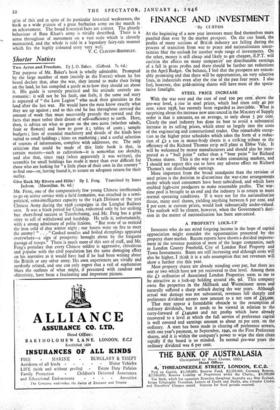FINANCE AND INVESTMENT
—By CUSTOS AT the beginning of a new year investors must find themselves more puzzled than ever by the market prospect. On the one hand, the profits of many sections of British industry are falling during the process of transition from war to peace and nationalisation uncer- tainties blur the outlook for another wide range of investments. On the other, money is still cheap and likely to get cheaper, .E.P.T. will cushion ihe effects on many companies' net distributable earnings. of a fall in gross profits and there should be further tax reductions in the April Budget. On balance, I feel that the prospects are reason- ably promising and that there will' be opportunities, on very selective lines, in industrials even after the rise of the past four years. I also feel, however, that gold-mining shares will have most of the specu- lative STEEL PRICE INCREASE With the war over and the cost of coal too per cent. above the pre-war level, a rise 'in steel prices, which had risen only 40 per cent. since 1938, has recently been regarded as inevitable. What is surprising about the increase now anncunced in the Ministry of Supply order is that it amounts, on an average, to only about 5 per cent. Clearly the steel industry has done its best to avoid a substantial increase in its selling prices, which enter so largely into the costs of the engineering and constructional trades. One remarkable excep- tion to the higher price schedules which takes the form of a reduc- tion of £2 a ton in motor-body sheets is a striking tribute to the efficiency of the Richard Thomas strip mill plant at Ebbw Vale. It will be welcomed by motor manufacturers and should also be inter- preted as a " bull point " rather than a " bear point " for Richard Thomas shares. This is the way to widen consuming markets, and I should not expect this cut to have any adverse effect on Richard Thomas's net distributable earnings.
More important from the broad standpoint than the revision' of steel prices is the decision to discontinue the war-time arrangements under which steel consumers have been subsidised, and which have enabled high-cdst prodpcers to make reasonable profits. The war- time pool- is brought to an end and the industry is to return to more normal operating conditions. If it were not for the nationalisation threat, many steel shares, yielding anything between 6 per cent. and 8 per cent. at current prices, would look substantially under-valued. The outlook will be clearer, however, when the Government's deci- sion in the matter of nationalisation has been announced.
A PROPERTY LOCK-UP • Investors who do not mind forgoing income in the hope of capital appreciation might consider the opportunities presented by the property share market. Recent reports have shown a decided improve- ment in the revenue• position of most of the larger companies, such' as London County Freehold, City of London Real Property and Town Investments. Rents are still increasing and although costs will also be higher, I think it is a safe assumption that net revenues will show a, further rise this year.
Most property shares are already standing over par, but there are one or two which have not yet recovered to that level. Among them the Li ordinaries of Associated London Properties seem to me to be attractive as a lock-up holding around t6s. 9d. This company. owns flat properties in the Millbank and Westminster" areas and naturally suffered a sharp setback during the war years. Although actual war damage was not substantial, revenues fell sharply and preference dividend arrears now amount to a net sum of L93,000. That may appear a formidable obstacle to the resumption of ordinary dividends, but it needs to be viewed in relation to the carry-forward of L140,000 and net profits which have already recovered to a level at which the full service of preference capital is well covered and earnings amount to about to per cent. on the ordinary. A start has been made in clearing off preference arrears, with one year's payment, to September, 1940, on the First Preference shares, and it is within the company's power to wipe the slate clean rapidly if the board is so minded. In normal pre-war years the ordinary dividend was 6 per cent.































 Previous page
Previous page